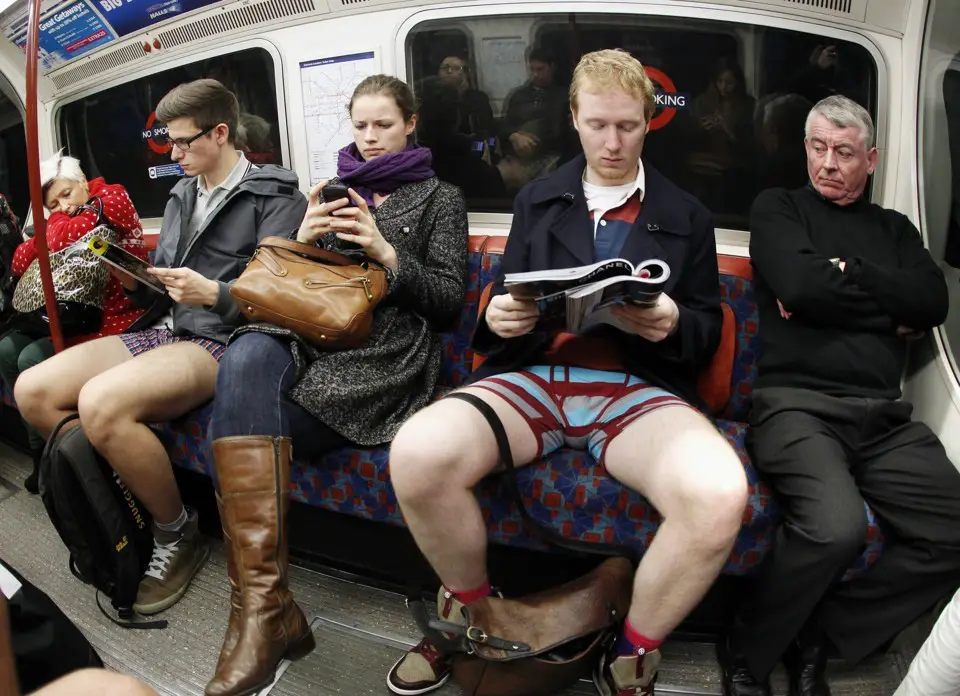Womansplaining Manspreading
Taking up too much space on the bus makes you an asshole, not a gender terrorist.
By Kristian Porter, Northern Kentucky University
Assimilated into the public vernacular by publications like “Buzzfeed,” specifically through instances such as the media company’s one-week experiment, “manspreading” has become one of many issues reviled by so-called modern feminists.
Manspreading is the phenomenon that occurs on public transportation when men spread their legs wide enough to take up two seats. The internet has debated this issue for years, mostly settling on two sides: Men have to spread their legs to make room for their genitalia, or men are only spreading their legs to oppress women into consequently taking up less space, therefore furthering the dreaded patriarchy.
There has even been an entirely different problem raised from the debate; accused men have argued that women take up just as much space on trains and buses by placing their bags on the adjacent seat, bestowing women with their own moniker of she-bagging.

Both sides of the manspreading and she-bagging argument have one fatal flaw—making this a gendered issue in the first place. Whether men are spreading their legs intentionally or women are placing their bags vengefully doesn’t matter. The real issue is that doing both of these things is pretty shitty social behavior.
To be fair to those with testicles, I do not know what that feels like and I never will. I can imagine that sitting with all of that extra junk in your pants can be rather uncomfortable, particularly if a body part drifts to a bad spot. I understand your need to adjust your position and even your need to adjust your balls (even in public, though I really don’t want to watch you do it). I even recognize that there is some science to back up your frustrations.
What I don’t understand, however, is why your lack of comfort takes precedence over your manners. Though sitting with your legs together may not pose the best seating arrangement, public transportation has never been famous for its luxury.
When you ride the bus or train, you do so because it’s the cheapest, most efficient means of travel; you don’t do it because it’s fun. Squishing yourself next to a stranger who probably smells like what he or she ate for lunch is not anyone’s idea of a good time, but it’s what is to be expected.
Why then, should your sitting position be any different?
If there are few people on the bus, then, by all means, take up as much space as you want. Stretch your legs to the most awkward, obnoxious angle. Be free. If, however, the bus begins to fill up, and someone needs to take the seat next to you, bring your legs back together and give the stranger his or her designated space. It’s that simple.
In that same vein, those who carry bags onto the bus or train should remain aware of the amount of space they are taking up. I concede that riding for a long period of time with heavy bags positioned on your lap can be uncomfortable and sometimes even painful, but if the facility is full and someone needs a ride, then removing your bags from the seat next to you is the polite action to take.
Living in the city and so close to my college campus, I chose to forego buying a car and instead utilize public transportation regularly.
Spending at least an hour every day on the bus means I have seen my fair share of weird, sketchy situations, and I have also been a witness, victim and, to be honest, accidental perpetrator of manspreading and she-bagging.
I have squished myself as small as I could toward the window as a man took up half of my seat with his thigh. I have also stood for an entire bus trip because another college student didn’t want to move her backpack to let me sit down. Both of these instances infuriated me, but I never once thought to blame their insensitive behavior on their gender. To me, the real problem with these situations always seemed to have more to do with their personal moral code than with their identity as male or female.
On some level, I can see the argument for manspreading being a mechanism of the patriarchy.
While I was growing up, I can remember a dozen times when my mom would tell me to close my legs and sit like a lady. Most of those times were in public, but even in the comfort of our home, I was still taught that, to be a lady, I was to sit with my legs crossed, taking up very little space.
Men, on the other hand, are not taught this. They are allowed to freely sit however they want. My heart is with those who want to make manspreading a cause for feminism to rally behind.
Yet, when you put the acts into context with the code of conduct for using public transportation, whether or not the root cause of this phenomenon is a systemic belief by society that men are superior is irrelevant.
Each seat is made to house one body. If someone who is elderly, handicapped or pregnant enters and you are sitting in the front, you are supposed to offer your seat, regardless of whether the bus or train is full. If there is an empty seat next to you, you shouldn’t obstruct its usage.
These social rules are common courtesy, and they’re meant to be obliged by every passenger.
The fact that there are enough documented instances of manspreading (and she-bagging, for that matter) to warrant an entire investigation into its cause and to create a large campaign to prevent it means it’s occurring entirely too frequently. That, by definition, makes manspreading an issue. However, obnoxiously preventing someone from sitting by spreading your legs doesn’t make you a misogynist. It just makes you an asshole.











[…] concept de manspreading de ne faire parler de lui que pour relancer une stérile guerre des sexes. Et de rétorquer que si les hommes prennent de la place avec leurs jambes, les femmes agacent aussi … A ce compte-là, on ne risque effectivement pas d’élever le […]